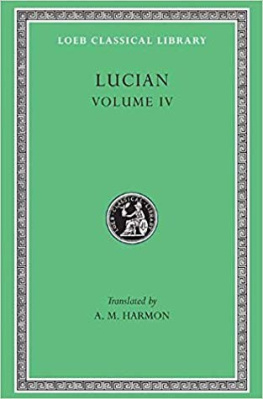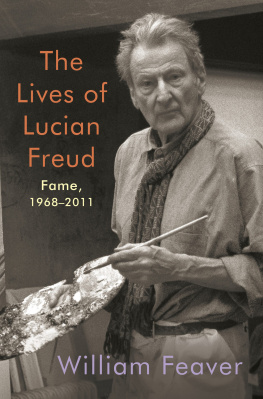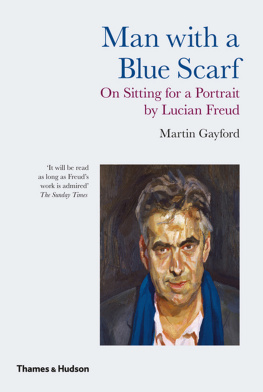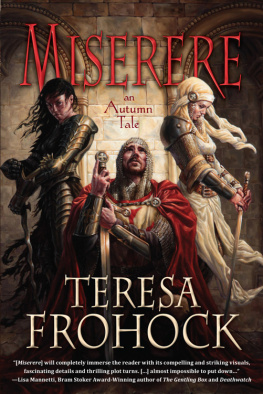Lucian of Samosata - The Works of Lucian of Samosata — Volume 01
Here you can read online Lucian of Samosata - The Works of Lucian of Samosata — Volume 01 full text of the book (entire story) in english for free. Download pdf and epub, get meaning, cover and reviews about this ebook. year: 2004, genre: Science. Description of the work, (preface) as well as reviews are available. Best literature library LitArk.com created for fans of good reading and offers a wide selection of genres:
Romance novel
Science fiction
Adventure
Detective
Science
History
Home and family
Prose
Art
Politics
Computer
Non-fiction
Religion
Business
Children
Humor
Choose a favorite category and find really read worthwhile books. Enjoy immersion in the world of imagination, feel the emotions of the characters or learn something new for yourself, make an fascinating discovery.
- Book:The Works of Lucian of Samosata — Volume 01
- Author:
- Genre:
- Year:2004
- Rating:4 / 5
- Favourites:Add to favourites
- Your mark:
- 80
- 1
- 2
- 3
- 4
- 5
The Works of Lucian of Samosata — Volume 01: summary, description and annotation
We offer to read an annotation, description, summary or preface (depends on what the author of the book "The Works of Lucian of Samosata — Volume 01" wrote himself). If you haven't found the necessary information about the book — write in the comments, we will try to find it.
The Works of Lucian of Samosata — Volume 01 — read online for free the complete book (whole text) full work
Below is the text of the book, divided by pages. System saving the place of the last page read, allows you to conveniently read the book "The Works of Lucian of Samosata — Volume 01" online for free, without having to search again every time where you left off. Put a bookmark, and you can go to the page where you finished reading at any time.
Font size:
Interval:
Bookmark:
The Project Gutenberg EBook of The Works of Lucian of Samosata, Volume 1
This eBook is for the use of anyone anywhere in the United States and most
other parts of the world at no cost and with almost no restrictions
whatsoever. You may copy it, give it away or re-use it under the terms of
the Project Gutenberg License included with this eBook or online at
www.gutenberg.org. If you are not located in the United States, you'll have
to check the laws of the country where you are located before using this ebook.
Title: The Works of Lucian of Samosata, Volume 1
Author: Lucian of Samosata
Translated by H.W. Fowler And F.G. Fowler
Release Date: November 27, 2002 [EBook #6327]
Last updated: June 26, 2019
Language: English
*** START OF THIS PROJECT GUTENBERG EBOOK THE WORKS OF LUCIAN OF SAMOSATA ***
Produced by Beth Constantine, Juliet Sutherland, Charles Franks
and the Online Distributed Proofreading Team.
What work nobler than transplanting foreign thought into the barren domestic soil? except indeed planting thought of your own, which the fewest are privileged to do.Sarlor Resartus.
At each flaw, be this your first thought: the author doubtless said something quite different, and much more to the point. And then you may hiss me off, if you will.LUCIAN, Nigrinus, 9.
(LUCIAN) The last great master of Attic eloquence and Attic wit.Lord Macaulay.
The text followed in this translation is that of Jacobitz, Teubner, 1901, all deviations from which are noted.
In the following list of omissions, italics denote that the piece is marked as spurious both by Dindorf and by Jacobitz. The other omissions are mainly by way of expurgation. In a very few other passages some isolated words and phrases have been excised; but it has not been thought necessary to mark these in the texts by asterisks.
Halcyon; Deorum Dialogi, iv, v, ix, x, xvii, xxii, xxiii; Dialogi Marini, xiii; Vera Historia, I. 22, II. 19; Alexander, 41,42; Eunuchus; De Astrologia; Amores; Lucius sive Asinus; Rhetorum Preceptor, 23; Hippias; Adversus Indoctum, 23; Pseudologista; Longaevi; Dialogi Meretricii, v, vi, x; De Syria Dea; Philopatris; Charidemus; Nero; Tragodopodagra; Ocypus; Epigrammata.
A word may be said about four pieces that seem to stand apart from the rest. Of these, the Trial in the Court of Vowels and A Slip of the Tongue will be interesting only to those who are familiar with Greek. The Lexiphanes and A Purist Purized, satirizing the pedants and euphuists of Lucian's day, almost defy translation, and they must be accepted at best as an effort to give the general effect of the original.
The Notes explanatory at the end of vol. iv will be used by the reader at his discretion. Reference is made to them at the foot of the page only when it is not obvious what name should be consulted.
The translators take this opportunity of offering their heartiest thanks to the Delegates of the Clarendon Press for undertaking this work; and, in particular, to the Vice-Chancellor of Oxford University, Dr. Merry, who has been good enough to read the proofs, and to give much valuable advice both on the difficult subject of excision and on details of style and rendering. In this connexion, however, it should be added that for the retention of many modern phrases, which may offend some readers as anachronistic, responsibility rests with the translators alone.
| i, ii, iii, vi, vii, viii, xi, xii, xiii, xiv, xv, xvi, xviii, xix, xx, xxi, xxiv, xxv, xxvi. |
| i, ii, iii, iv, v, vi, vii, viii, ix, x, xi, xii, xiv, xv. |
| I, II, III, IV, V, VI, VII, VIII, IX, X, XI, XII, XIII, XIV, XV, XVI, XVII, XVIII, XIX, XX, XXI, XXII, XXIII, XXIV, XXV, XXVI, XXVII, XXVIII, XXIX, XXX. |
1. LIFE.
2. PROBABLE ORDER OF WRITINGS.
3. CIRCUMSTANCES OF THE TIME.
4. LUCIAN AS A WRITER.
It is not to be understood that all statements here made are either ascertained facts or universally admitted conjectures. The introduction is intended merely to put those who are not scholars, and probably have not books of reference at hand, in a position to approach the translation at as little disadvantage as may be. Accordingly, we give the account that commends itself to us, without discussion or reference to authorities. Those who would like a more complete idea of Lucian should read Croiset's Essai sur la vie et les oeuvres de Lucien, on which the first two sections of this introduction are very largely based. The only objections to the book (if they are objections) are that it is in French, and of 400 octavo pages. It is eminently readable.
With the exception of a very small number of statements, of which the truth is by no means certain, all that we know of Lucian is derived from his own writings. And any reader who prefers to have his facts at first rather than at second hand can consequently get them by reading certain of his pieces, and making the natural deductions from them. Those that contain biographical matter are, in the order corresponding to the periods of his life on which they throw light, The Vision, Demosthenes, Nigrinus, The Portrait-study and Defence (in which Lucian is Lycinus), The Way to write History, The double Indictment (in which he is The Syrian), The Fisher (Parrhesiades), Swans and Amber, Alexander, Hermotimus (Lycinus), Menippus and Icaromenippus (in which Menippus represents him), A literary Prometheus, Herodotus, Zeuxis, Harmonides, The Scythian, The Death of Peregrine, The Book-fancier, Demonax, The Rhetorician's Vade mecum, Dionysus, Heracles, A Slip of the Tongue, Apology for 'The dependent Scholar.' Of these The Vision is a direct piece of autobiography; there is intentional but veiled autobiography in several of the other pieces; in others again conclusions can be drawn from comparison of his statements with facts known from external sources.
Lucian lived from about 125 to about 200 A.D., under the Roman Emperors Antoninus Pius, M. Aurelius and Lucius Verus, Commodus, and perhaps Pertinax. He was a Syrian, born at Samosata on the Euphrates, of parents to whom it was of importance that he should earn his living without spending much time or money on education. His maternal uncle being a statuary, he was apprenticed to him, having shown an aptitude for modelling in the wax that he surreptitiously scraped from his school writing-tablets. The apprenticeship lasted one day. It is clear that he was impulsive all through life; and when his uncle corrected him with a stick for breaking a piece of marble, he ran off home, disposed already to think he had had enough of statuary. His mother took his part, and he made up his mind by the aid of a vision that came to him the same night.
It was the age of the rhetoricians. If war was not a thing of the past, the shadow of the pax Romana was over all the small states, and the aspiring provincial's readiest road to fame was through words rather than deeds. The arrival of a famous rhetorician to lecture was one of the important events in any great city's annals; and Lucian's works are full of references to the impression these men produced, and the envy they enjoyed. He himself was evidently consumed, during his youth and early manhood, with desire for a position like theirs. To him, sleeping with memories of the stick, appeared two women, corresponding to
Font size:
Interval:
Bookmark:
Similar books «The Works of Lucian of Samosata — Volume 01»
Look at similar books to The Works of Lucian of Samosata — Volume 01. We have selected literature similar in name and meaning in the hope of providing readers with more options to find new, interesting, not yet read works.
Discussion, reviews of the book The Works of Lucian of Samosata — Volume 01 and just readers' own opinions. Leave your comments, write what you think about the work, its meaning or the main characters. Specify what exactly you liked and what you didn't like, and why you think so.









